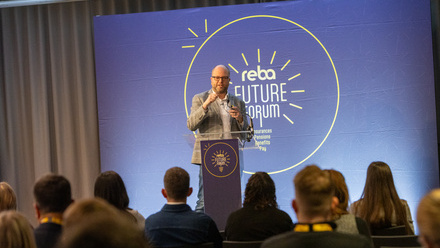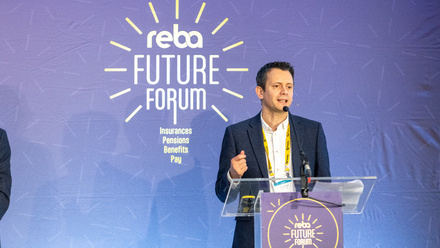How to build a physical health benefits strategy for a multi-generational workforce

Balancing the physical health needs and expectations of a multi-generational workforce is a challenge for employers, but one that can pay substantial dividends if executed well with benefits that meet the specific needs of each group.
Baby boomers grew up, and were influenced by, the post-war era and are the first generation facing later retirement.
Generation X employees have lived through boom and bust times, the internet explosion and have care responsibilities for both children and elderly relatives.
Millennials, or ‘digital natives’, have been raised during times of instant gratification, and worries such as student debts and difficulties getting on the property ladder are having an impact on their health.
Understanding the unique pressures, needs and expectations of each generational cohort enables employers to build physical health strategies that really benefit employees’ individual requirements.
The Willis Towers Watson Global Benefits and Attitudes Survey (GBAS) (2017/18) uncovered some interesting insights into the benefits preferences of each group.
What Baby boomers want
It is predicted that individuals in the 50–70 age group will comprise 30 per cent of workers in the UK by 2020.
According to the Office for National Statistics (ONS), 14.8 million people, or 23 per cent of the UK population, are individuals belonging to this generation.
GBAS identified that a third (33 per cent) of workers in this cohort were highly stressed, with 20 per cent stating that they had suffered with anxiety and depression.
Financial worries were a key cause of stress for nearly a quarter of baby boomers and 24 per cent of baby boomers also cited their health as a key source of stress.
Surprisingly however, the study also revealed that baby boomers were the generation least interested in health insurance (10 per cent) with financial security of paramount concern.
Just over half of baby boomers chose retirement plans and benefits protecting their financial wellbeing as a priority, followed by life insurance and financial protection (16 per cent), and paid annual leave (15 per cent).
The health of baby boomers
The Department of Health’s Health of the Baby Boomer Generation report (2016) highlights that 42 per cent of this group are living with at least one medical condition. It also revealed that nearly a quarter (24 per cent) were managing more than one condition.
The most common physical health issues among this cohort are musculoskeletal (MSK) problems (21 per cent), circulatory issues (17 per cent) and depression and anxiety (eight per cent).
Coronary disease is the most common cause of death among baby boomers, caused by smoking, poor diet and a high Body Mass Index (BMI).
The report found, however, that baby boomers now smoke less than the previous generation at the same age but were also now less physically active.
How to support baby boomers
Supporting baby boomers’ physical health with tailored health benefits is essential to their wellbeing and productivity, as they continue working to a much older age than their predecessors.
Flexible working options and ergonomic workstations will help to optimise the wellbeing of those managing MSK.
Onsite health assessments, discounted gym memberships and long-term care insurance alongside internal education campaigns on healthy lifestyles can all benefit these employees.
Generation X’s requirements
Half of Generation X employees (50 per cent) are highly stressed in the UK, according to GBAS. The ONS reports that 13 million people, or a fifth of the UK population (20 per cent), belong to this generation.
Juggling childcare responsibilities with caring for elderly relatives, Generation Xers also have health concerns relating to middle age – including weight gain due to a slower metabolism, muscle loss due to ageing, hypertension and menopause.
Twenty-eight per cent reported suffering from stress and anxiety, according to GBAS. More than a third blamed financial concerns and 24 per cent believe that their health was a key factor behind their raised stress levels.
Generation Xers prioritised wealth benefits (44 per cent), followed by protective benefits, such as life insurance and financial protection (18 per cent), and 15 per cent wanted more paid annual leave.
Benefits for Generation X
Benefits to meet the specific needs of this cohort include childcare vouchers, flexible working arrangements to fit with care responsibilities, dental insurance for the whole family and support services to advise on care options.
Wearable technology to monitor and boost physical activity and health conditions would also benefit Generation Xers with half of UK workers regularly using this technology, found GBAS.
Priorities for Millennials
The latest ONS figures show that 13.8 million people in the UK are Millennials (21 per cent of the population). GBAS identified Millennials as the most stressed, most health conscious and the most financially strained of the three generations.
Sixty-one per cent of Millennials told us that they were highly stressed with more than a third (34 per cent) stating that they had suffered from anxiety and depression – the highest proportion of the three generations.
Millennials want a greater spread of benefits. This generation also prioritised wealth benefits (32 per cent), 21 per cent wanted protective benefits – such as life and financial insurance – and 17 per cent cited more paid annual leave.
Nearly half of young workers (47 per cent) told GBAS that their finances were a key reason for their heightened stress, followed by their health (29 per cent) – the highest figures among the different generations.
What to offer Millennials
Obesity, sleep deprivation and mental health issues are particularly prevalent among younger employees. Millennials are conscious about protecting their physical wellbeing, with 16 per cent citing health benefits as a priority, compared with 12 per cent of Generation Xers and just 10 per cent of baby boomers.
Wearable technology, health insurance, discounted gym memberships, cycle-to-work schemes and financial incentives would deliver tailored support to younger employees.
As the health and wellbeing of workers increasingly tops the agenda for businesses, wider benefits, such as Employee Assistance Programmes (EAPs), serve to support and enhance the wellbeing of all workers, regardless of age.
The author is Mike Blake, wellbeing lead at Willis Towers Watson.
This article was provided by Willis Towers Watson.
Willis Towers Watson is sponsoring REBA’s Innovation Day, taking place on 22 November at County Hall, London.
Supplied by REBA Associate Member, WTW
WTW is a leading global advisory, broking and solutions company.







